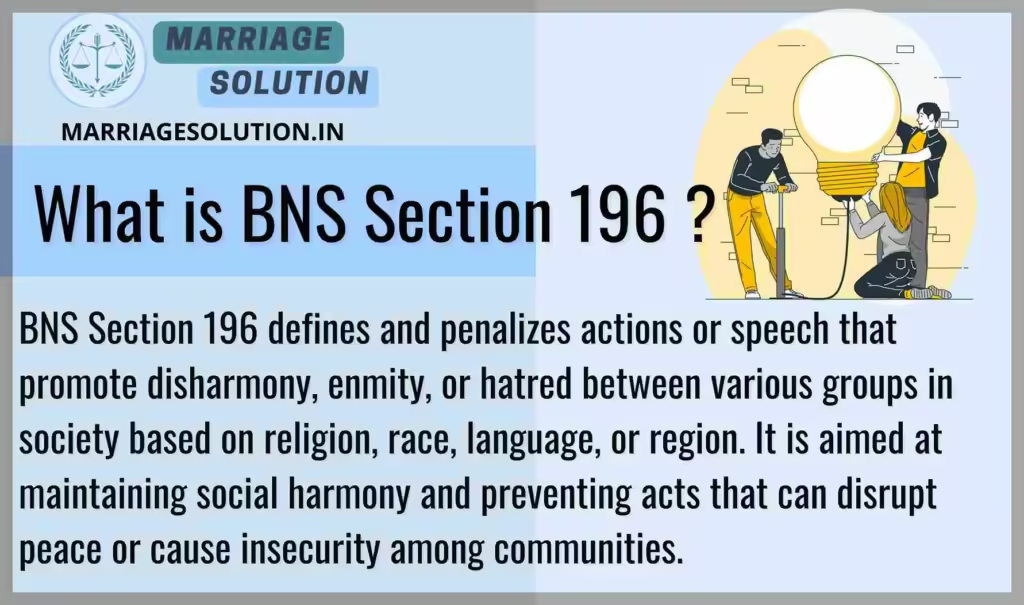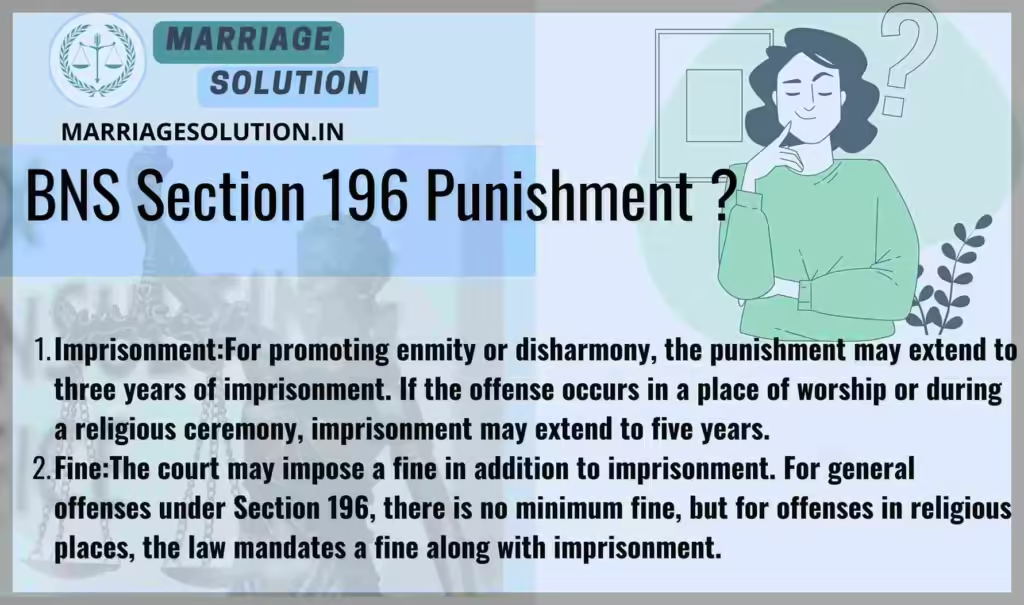Introduction of 196 BNS
196 BNS is a significant provision in the Bharatiya Nyaya Sanhita that deals with acts promoting hatred or disharmony between groups in society. It criminalizes speech, actions, or representations that incite enmity on grounds such as religion, race, language, place of birth, residence, or community differences. The section aims to protect public peace, national integration, and social harmony by deterring individuals or groups from spreading hatred.
A key feature of this section is its stricter punishment when such acts occur in places of worship or during religious ceremonies, recognizing the sensitivity of such environments.
The Bharatiya Nyaya Sanhita (BNS) Section 196 replaces the old Indian Penal Code (IPC) Section 153-A.
What is BNS Section 196 ?
BNS Section 196 defines and penalizes actions or speech that promote disharmony, enmity, or hatred between various groups in society based on religion, race, language, or region. It is aimed at maintaining social harmony and preventing acts that can disrupt peace or cause insecurity among communities.

Under Section 196 of the bns act 2023
Whoever, by words (spoken or written), signs, visible representations, or electronic means, promotes enmity, hatred, or ill-will between different groups on grounds of religion, race, language, place of birth, residence, caste, community, or does any act prejudicial to peace, harmony, or unity, shall be punished.
If such an act is committed in a place of worship or during a religious ceremony, stricter punishment applies.
1. Meaning of “Promoting Enmity Between Groups”
- To promote enmity means to create divisions, hatred, or ill-feelings between communities.
- This can be done through hate speeches, writings, slogans, social media posts, or actions.
- Example: Delivering a speech encouraging one community to boycott another, or spreading rumors to instigate violence.
- Even attempts to provoke hatred, even if no violence occurs, are punishable.
Who is Covered Under This Section?
This law applies to any person who:
- Makes speeches or writings promoting hatred.
- Uses signs, symbols, posters, cartoons, memes, or online content to spread ill-will.
- Organizes rallies, drills, or training that involve promoting hostility between groups.
- Incites hatred at sensitive places such as temples, mosques, churches, gurdwaras, or during festivals.
3. Nature of the Offence
- Cognizable → Police can arrest without a warrant.
- Non-bailable → Bail is not a matter of right; it depends on the court.
- Non-compoundable → The case cannot be settled privately; it must go through the legal system.
- Triable by Magistrate of the First Class → Serious enough to be handled by a senior magistrate.
4. Examples of BNS Section 196
Example 1 – Hate Speech in Rally
A person makes an inflammatory speech at a political rally urging people to attack another religious group. This is punishable under BNS 196.
Example 2 – Online Hate Posts
Someone creates fake news on social media, blaming a linguistic community for spreading disease, leading to panic. This act comes under this section.
Example 3 – Religious Place Conflict
During a festival, an individual deliberately insults another community inside a temple or mosque, creating tension. Here, punishment is stricter (up to 5 years).
Example 4 (Not Guilty)
If a person unknowingly shares information without any intention to spread hatred, and it does not disturb peace, they may not be held guilty.
5. Punishment under BNS Section 196
- General Case: Imprisonment up to 3 years, or fine, or both.
- If committed in a Place of Worship / Religious Ceremony: Imprisonment up to 5 years + fine (stricter punishment).
6. Importance of BNS Section 196
- Maintains Social Harmony: Prevents tensions between religious, racial, or linguistic groups.
- Protects Sacred Places: Imposes stricter rules for offences in temples, mosques, churches, gurdwaras, etc.
- Stops Hate Speech & Online Abuse: Covers both offline and online hate content.
- Upholds Unity & Security: Ensures that no one misuses freedom of speech to harm national peace and integrity.
Section 196 BNS Overview
BNS Section 196 plays a critical role in protecting public harmony by preventing acts that promote division based on religion, race, language, and other grounds. The section ensures that individuals who attempt to incite hatred or violence against specific groups are penalized to maintain societal peace and security.
10 Key Points of BNS Section 196 Explained:
- Promotion of Enmity Through Words or Actions:
This section penalizes individuals who, through words (spoken or written), signs, visible representations, or even electronic communication, promote enmity between different groups. For example, someone spreading hate speech about a specific religious or racial group falls under this category. - Grounds for Promotion of Enmity:
The enmity must be based on certain grounds, such as religion, race, place of birth, residence, language, caste, or community. The law specifically focuses on preventing divisions in society caused by these factors. - Disturbance of Public Harmony:
Any act that disturbs or is likely to disturb public peace and harmony among various groups is punishable under this section. This ensures that even attempts to cause discord are addressed. - Use of Criminal Force or Violence:
If someone organizes or participates in activities like drills or movements with the intention or knowledge that criminal force or violence will be used against a particular community, this also falls under BNS Section 196. - Involvement in Activities Leading to Insecurity:
Participating in or promoting activities that cause fear, alarm, or insecurity among a specific group based on religion, race, or language is punishable. For example, organizing a rally intending to scare a religious community violates this section. - Punishment for General Offenses Under Section 196(1):
For general offenses like promoting enmity or disturbing harmony, the punishment can extend to three years of imprisonment, a fine, or both. This is a significant penalty aimed at deterring individuals from engaging in such actions. - Offenses Committed in Places of Worship:
If an offense is committed in a place of worship or during a religious ceremony, the punishment is more severe. This section recognizes the sensitivity of religious spaces and the potential for greater harm in these situations. - Punishment for Offenses in Places of Worship (Section 196(2)):
If someone promotes enmity in a place of worship or during religious ceremonies, they can face up to five years of imprisonment, along with a fine. The law takes a strict stance against such offenses in sacred spaces. - Cognizability and Bailability:
Offenses under BNS 196 are cognizable, meaning the police can arrest without a warrant. However, they are non-bailable, indicating that securing bail is more difficult and depends on the discretion of the court. - Jurisdiction of the Magistrate:
Offenses under BNS Section 196 are triable by a Magistrate of the first class, meaning that a higher-ranking judicial officer will handle these cases due to their seriousness.
Examples of BNS Section 196:
- Example 1 – Hate Speech Based on Religion:
A person delivers a public speech inciting hatred against a specific religious group, urging people to boycott their businesses. This act promotes enmity between different religious groups and disturbs public peace, making it punishable under BNS Section 196. - Example 2 – Organizing a Violent Rally:
An individual organizes a rally aimed at training participants to use violence against a particular language-speaking community. This rally instills fear among the targeted community and disrupts social harmony, violating BNS Section 196.
BNS 196 Punishment
- Imprisonment:
For promoting enmity or disharmony, the punishment may extend to three years of imprisonment. If the offense occurs in a place of worship or during a religious ceremony, imprisonment may extend to five years. - Fine:
The court may impose a fine in addition to imprisonment. For general offenses under Section 196, there is no minimum fine, but for offenses in religious places, the law mandates a fine along with imprisonment.

BNS 196 bailable or not ?
- Cognizable and Non-bailable:
Offenses under BNS Section 196 are cognizable, meaning the police can arrest without a warrant, and they are non-bailable, meaning bail is not a matter of right but depends on the discretion of the court.
Comparison Table – BNS Section 196 vs IPC Sections 153A
| Section | What it Means | Punishment | Bail | Cognizable? | Trial By |
|---|---|---|---|---|---|
| BNS Section 196 | Penalizes anyone who promotes enmity, hatred, or ill-will between groups based on religion, race, language, place of birth, residence, caste, or community through words, writings, signs, or electronic means. Includes stricter punishment for offences committed in places of worship or during religious ceremonies. |
General: Imprisonment up to 3 years, or fine, or both. In places of worship: Imprisonment up to 5 years + fine. |
Non-bailable | Cognizable | Magistrate of the First Class |
| IPC Section 153A (Old) | Punished promoting enmity between groups based on religion, race, language, or place of birth through words, writings, or representations, disturbing public tranquility or harmony. Did not include specific provisions for offences in places of worship. | Imprisonment up to 3 years, or fine, or both. | Non-bailable | Cognizable | Magistrate of the First Class |
| Key Difference: BNS 196 modernizes IPC 153A by explicitly including electronic communication and introducing stricter penalties for acts in places of worship or religious ceremonies, strengthening India’s legal framework against hate speech and promoting harmony in a digital age. | |||||
BNS Section 196 FAQs
What is BNS Section 196?
BNS Section 196 punishes acts that promote enmity or disharmony between different communities based on religion, race, language, etc.
What is the punishment for promoting enmity under BNS 196?
The punishment can extend to 3 years of imprisonment or a fine, or both. If the offense occurs in a place of worship, the imprisonment can extend to 5 years.
Is BNS Section 196 a bailable offense?
No, it is a non-bailable offense, meaning the court decides whether bail can be granted.
Can someone be arrested without a warrant under Section 196?
Yes, it is a cognizable offense, meaning the police can arrest the accused without a warrant.
What happens if the offense occurs in a place of worship?
If the offense occurs in a place of worship, the punishment increases to imprisonment for up to 5 years, along with a fine.
Who will hear cases under BNS Section 196?
Cases under BNS Section 196 are triable by a Magistrate of the First Class.
Conclusion
BNS Section 196 strengthens India’s commitment to unity and public order by targeting hate speech and divisive actions. Unlike the IPC, it introduces stricter punishments for offences committed in religious places, recognizing their sensitivity. By making the offence cognizable and non-bailable, the law ensures immediate intervention and sends a clear message against spreading enmity. This provision not only discourages hate-mongering but also promotes peace, tolerance, and harmony in a diverse society like India.
Need Legal Support?
If you are dealing with court cases, marriage problems, or any other legal issue, our team at Marriage Solution – Lawyer Help is here for you. Simply fill out our quick online enquiry form, and we’ll connect you with the right legal expert to support your needs.
Finished with BNS 196 ? Continue exploring the next provisions of the Bharatiya Nyaya Sanhita (BNS), 2023. Each section includes explanations, examples, and plain-language breakdowns for easy understanding.
- BNS 197 : Imputations, assertions prejudicial to national integration.
- https://marriagesolution.in/bns_section/bns-197/
Chapter XII – Of Offences By Or Relating To Public Servants
- BNS 198 : Public servant disobeying law, with intent to cause injury to any person.
- https://marriagesolution.in/bns_section/bns-198/
- BNS 199 : Public servant disobeying direction under law.
- https://marriagesolution.in/bns_section/bns-199/
- BNS 200 : Punishment for non-treatment of victim.
- https://marriagesolution.in/bns_section/bns-200/
- BNS 201 : Public servant framing an incorrect document with intent to cause injury.
- https://marriagesolution.in/bns_section/bns-201/
Full IPC Section List: https://marriagesolution.in/ipc-section-list
All Indian Law & Blogs: https://marriagesolution.in/indian-law/
Full BNSS Section List: https://marriagesolution.in/bnss_section-list
